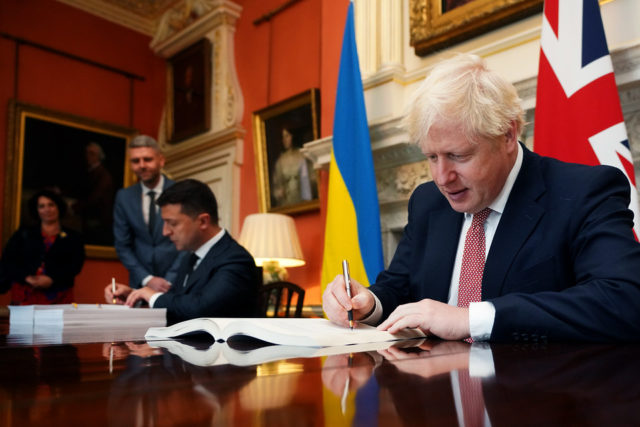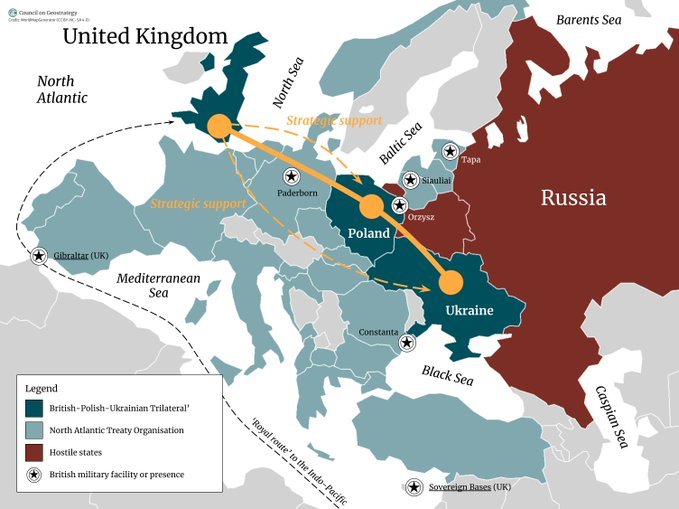
Delusions of a British-Polish-Ukrainian Alliance?
Publication: Eurasia Daily Monitor Volume: 19 Issue: 20
By:

The ongoing Russian military buildup along Ukraine’s borders has raised numerous concerns about whether the situation could escalate into all-out war (see November 8, 2021 and January 26, 2022) and triggered a wide-scale international response (see EDM, January 18). Notably, the crisis has more energetically re-involved the United States in official diplomatic negotiations over Ukraine as well as widened the group of countries actively providing Ukraine with military aid. Perhaps the only benefit Russia has gained so far as a result of its saber rattling has been to sow fresh seeds of doubt regarding the coherence of the North Atlantic Treaty Organization’s (NATO) and the European Union’s policies toward Ukraine, especially in the context of German-Ukrainian relations, which have deteriorated as a result of Kyiv’s dissatisfaction with Berlin’s soft policy toward Moscow (Osw.waw.pl, January 27; see EDM, February 3, 7).
Ukraine’s strategy has long hinged on trying to internationalize its conflict with Russia; it is supported by a number of countries, with the United Kingdom being one Europe’s leaders when it comes to military assistance (Parliament.uk, February 1, 2022; see EDM, December 15, 2020). Notably, following the annexation of Crimea and onset of war in Donbas, the UK was the first Euro-Atlantic country to deploy uniformed personnel to Ukraine to carry out a sustained training mission, in March 2015. It contributes to defending freedom of navigation in the Black Sea—as notably illustrated by the June 2021 HMS Defender incident off the coast of Crimea (see EDM, June 24, 2021) Moreover, British troops are stationed along NATO’s Eastern Flank in relatively high numbers compared to most other European allies. All this has shaped Ukrainian foreign policy perceptions. Indeed, the country is desperately looking for external assistance and a security guarantor (see EDM, December 15, 2020), and the United Kingdom seems to fit this strategy as far as Kyiv is concerned.
Perhaps this is why Ukrainians responded enthusiastically to the enigmatic announcement made on January 21, 2022, by Elizabeth Truss, the British secretary of state for foreign affairs. While Truss spoke solely of the UK’s role in “fostering new trilateral ties with Poland and Ukraine,” (Gov.uk, January 21), the statement was immediately interpreted as an announcement of the establishment of a new military alliance. The same day, the British think tank Council on Geostrategy presented an ambiguous map of “a new Trilateral” (Twitter.com/ConGeostrategy, January 21) that was widely disseminated online by various Ukrainian and Russian commentators and analysts, suggesting that this tripartite alliance was imminent (Facebook.com/anatoliy.amelin, 112.ua, Facebook.com/sergey.markov.5, January 22; BBC News—Ukrainian service, Ukrinform.net, January 30). Within days, the Sociological Group “Rating” published a poll that claimed 61 percent of Ukrainians supported the idea of forming a British-Polish-Ukrainian military alliance (Facebook.com/sociological.group.rating, January 24).

On February 1, Ukraine’s Foreign Minister Dmytro Kuleba announced that this trilateral grouping would be officially inaugurated the next day, during Foreign Secretary Truss’ visit to Kyiv; but her trip had to be suddenly called off due to the British official receiving a positive COVID-19 test result (Facebook.com/dmytro.kuleba, February 1). Nevertheless, Kuleba still took the opportunity to clarify that the vaunted British-Polish-Ukrainian triangle would not be a military alliance in the traditional sense but rather a trilateral platform for cooperation, similar to other initiatives of this kind that Ukraine is involved in, such as the Lithuanian-Polish-Ukrainian Lublin Triangle (see EDM, August 5, 2020), Turkish-Ukrainian Quadriga Format (Mfa.gov.ua, March 24, 2021) or the Georgian-Moldovan-Ukrainian Association Trio (Mfa.gov.ge, May 17, 2021). The member countries of these less-formalized political cooperation platforms share some concerns with Ukraine and are ready to back it in various dimensions and to varying degrees, depending on their abilities, geopolitical goals and ambitions. At the same time, they fit Ukraine’s foreign policy strategy of building international ties through “minilateral” formats while it strives to join NATO, the EU and the Three Seas Initiative.
Ukraine’s independence is of crucial importance to Polish foreign and security policy. Hence, Warsaw has long supported Kyiv’s pro-Western path of development by backing NATO’s and the EU’s open-door policies as well as keeping the Ukrainian crisis on the international agenda. In reaction to the most recent Russian military buildup, Poland joined several allies in sending weapons to Ukraine, including advanced shoulder-fired anti-air missiles, unamend aerial vehicles (UAVs) and mortars (Twitter.com/mblaszczak, February 2). Nonetheless, the reactions to the proposed new British-Polish-Ukrainian triangle were more tempered in Poland compared to Ukraine. Former foreign minister Witold Waszczykowski commented that calling the initiative an “alliance” is nothing but a “journalistic exaggeration” (Polskie Radio, February 1). Radosław Sikorski, also a former minister of foreign affairs and an opposition leader, went so far as to assert that “[p]roviding security guarantees that cannot or are not intended to be fulfilled is dangerous for both sides” (Twitter.com/sikorskiradek, February 1).
Despite Warsaw’s efforts to engage other countries in backing Ukraine, when it comes to the idea of a trilateral format with the UK, Poland is emphasizing potential non-military areas of cooperation, which softens the narrative of a militarily focused alliance. The possibility of liquefied natural gas (LNG) transit via Poland to Ukraine is one example. That said, Poland is simultaneously bolstering its bilateral military ties with the United Kingdom. In November 2021, both countries signed a Statement of Intent on the development of elements of Polish air defense (Gov.uk, November 19, 2021); and approximately 100 British engineering troops are engaged in securing Poland’s border with Belarus (Twitter.com/MON.GOV.PL, February 7, 2022; see EDM, November 11, 2021). Moreover, another 350 UK troops were deployed to Poland on February 10 in response to the growing tensions in the region (Twitter.com/DefenceHQPress, February 7).
The United Kingdom has some potential to become a major security provider in Central Eastern Europe, but it will certainly not wholly replace the US in this role. The UK, unlike the US, is not the main force behind NATO and is certainly not a prime player when it comes to safeguarding security and stability in other regions. An escalation in Central Eastern Europe would not seriously put British credibility at stake. And considering the history of Britain’s centuries-long offshore balancer strategy in Europe, London may have some credibility problems to overcome when it comes to extended commitments and true intentions. In fact, Ukrainian President Volodymyr Zelenskyy’s repeat efforts to calm expectations of Russian aggression may be driven not only by fears of economic instability (Foreign Policy, January 28) but also concerns of becoming a battleground in a proxy war.
One should, therefore, not expect any spectacular, game-changing consequences from the British-Polish-Ukrainian triangle announcement. Perhaps the three partners may be able to craft an effective bit of strategic communication akin to the hyped but never used Polish-Lithuanian-Ukrainian Brigade. Yet their trilateral cooperation will only meaningfully contribute to Ukrainian prosperity and regional stability if perceived soberly and employed wisely without rhetorical delusions.



